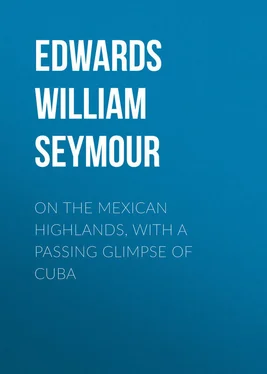William Edwards - On the Mexican Highlands, with a Passing Glimpse of Cuba
Здесь есть возможность читать онлайн «William Edwards - On the Mexican Highlands, with a Passing Glimpse of Cuba» — ознакомительный отрывок электронной книги совершенно бесплатно, а после прочтения отрывка купить полную версию. В некоторых случаях можно слушать аудио, скачать через торрент в формате fb2 и присутствует краткое содержание. Жанр: foreign_antique, foreign_prose, Путешествия и география, на английском языке. Описание произведения, (предисловие) а так же отзывы посетителей доступны на портале библиотеки ЛибКат.
- Название:On the Mexican Highlands, with a Passing Glimpse of Cuba
- Автор:
- Жанр:
- Год:неизвестен
- ISBN:нет данных
- Рейтинг книги:4 / 5. Голосов: 1
-
Избранное:Добавить в избранное
- Отзывы:
-
Ваша оценка:
- 80
- 1
- 2
- 3
- 4
- 5
On the Mexican Highlands, with a Passing Glimpse of Cuba: краткое содержание, описание и аннотация
Предлагаем к чтению аннотацию, описание, краткое содержание или предисловие (зависит от того, что написал сам автор книги «On the Mexican Highlands, with a Passing Glimpse of Cuba»). Если вы не нашли необходимую информацию о книге — напишите в комментариях, мы постараемся отыскать её.
On the Mexican Highlands, with a Passing Glimpse of Cuba — читать онлайн ознакомительный отрывок
Ниже представлен текст книги, разбитый по страницам. Система сохранения места последней прочитанной страницы, позволяет с удобством читать онлайн бесплатно книгу «On the Mexican Highlands, with a Passing Glimpse of Cuba», без необходимости каждый раз заново искать на чём Вы остановились. Поставьте закладку, и сможете в любой момент перейти на страницу, на которой закончили чтение.
Интервал:
Закладка:
I have once more visited the famous cathedral which faces the Plaza Grande. From the north tower of it, to the top of which I climbed by a wonderful convoluted staircase, ninety-two spiral steps without a core, I gained a view of the city. North and south and east and west it spread out several miles in extent. It lies beneath the view, a city of flat roofs, covering structures rarely more than two stories high, of stone and sun-dried brick, and painted sky blue, pink and yellow, or else remaining as white and clean as when first built, who knows how many hundreds of years ago? For here are no chimneys, no smoke and no soot! To the south I could descry the glistening surface of Lake Tezcoco, and to the west, at a greater distance, Lakes Chalco and Xochomilco. Never a cloud flecked the dark blue dome of the sky. Only, overhead, I noted one burst of refulgent whiteness. It was with difficulty that I could compel my comprehension to grasp the fact that this was nothing less than the snow summit of mighty Popocatepetl, so distant that tree and earth and rock along its base, even in this pellucid atmosphere, were hid in perpetual haze.
It is said that peoples differ from one another not merely in color, in form and in manners, but equally so in their peculiar and individual odors. The Chinese are said to find the European offensive to their olfactory nerves because he smells so much like a sheep. The Englishman vows the Italian reeks with the scent of garlic. The Frenchman declares the German unpleasant because his presence suggests the fumes of beer. Just so, have I been told that the great cities of the world may be distinguished by their odors. Paris is said to exhale absinthe. London is said to smell of ale and stale tobacco, and Mexico City, I think, may be said to be enwrapped with the scent of pulque ( Pool-Kay ). “ Pulque , blessed pulque ,” says the Mexican! Pulque , the great national drink of the ancient Aztec, which has been readily adopted by the Spanish conqueror, and which is to-day the favorite intoxicating beverage of every bibulating Mexican. At the railway stations, as we descended into the great valley wherein Mexico City lies, Indian women handed up little brown pitchers of pulque , fresh pulque new tapped. Sweet and cool and delicious it was, as mild as lemonade (in this unfermented condition it is called agua miel , honey water). The thirsty passengers reached out of the car windows and gladly paid the cinco centavos (five cents) and drank it at leisure as the train rolled on. Through miles and miles we traversed plantations of the maguey plant from which the pulque is extracted. For pulque is merely the sap of the maguey or “century plant,” which accumulates at the base of the flower stalk, just before it begins to shoot up. The pulque -gatherer thrusts a long, hollow reed into the stalk, sucks it full to the mouth, using the tongue for a stopper, and then blows it into a pigskin sack which he carries on his back. When the pigskin is full of juice, it is emptied into a tub, and when the tub is filled with liquor it is poured into a cask, and the cask is shipped to the nearest market. Itinerant peddlars tramp through the towns and villages, bearing a pigskin of pulque on their shoulders and selling drinks to whosoever is thirsty and may have the uno centavo (one cent) to pay for it. When fresh, the drink is delightful and innocuous. But when the liquid has begun to ferment, it is said to generate narcotic qualities which make it the finest thing for a steady, long-continuing and thorough-going drunk which Providence has yet put within the reach of man. Thousands of gallons of pulque are consumed in Mexico City every twenty-four hours, and the government has enacted stringent laws providing against the sale of pulque which shall be more than twenty-four hours old. The older it grows the greater the drunk, and the less you need drink to become intoxicated, hence, it is the aim of every thirsty Mexican to procure the oldest pulque he can get. In every pulque shop, where only the mild, sweet agua miel , fresh and innocuous, is supposed to be sold, there is, as a matter of fact, always on hand a well fermented supply, a few nips of which will knock out the most confirmed drinker almost as soon as he can swallow it.
I was passing a pulque shop this afternoon when I noticed a tall, brawny Indian coming out. He walked steadily and soberly half way across the street, when all of a sudden the fermented brew within him took effect and he doubled up like a jackknife, then and there. Two men thereupon came out of the self same doorway, picked him up head and heels, and I saw them sling him, like a sack of meal, into the far corner of the shop, there to lie, perhaps twenty-four hours, till he would come out of his narcotic stupor.
Riding out to the shrine of Guadeloupe the other afternoon, I passed many Indians leaving the city for their homes. Some were bearing burdens upon their backs, some were driving donkeys loaded with goods. Upon the back of one donkey was tied a pulque drunkard. His legs were tied about the donkey’s neck and his body was lashed fast to the donkey’s back. His eyes and mouth were open. His head wagged from side to side with the burro’s trot. He was apparently dead. He had swallowed too much fermented pulque . His compañeros were taking him home to save him from the city jail.
The Mexicans have a legend about the origin of their pulque . It runs thus: One of their mighty emperors, long before the days of Montezuma’s rule, when on a war raid to the south, lost his heart to the daughter of a conquered chief and brought her back to Tenochtitlan as his bride. Her name was Xochitl and she gained extraordinary power over her lord, brewing with her fair, brown hands a drink for which he acquired a prodigious thirst. He never could imbibe enough and, when tanked full, contentedly resigned to her the right to rule. Other Aztec ladies perceiving its soothing soporific influence upon the emperor, acquired the secret of its make and secured domestic peace by also administering it to their lords. Thus pulque became the drink adored by every Aztec. The acquisitive Spaniard soon “caught on” and has never yet let go.
The one redeeming feature about the pulque is that he who gets drunk on it becomes torpid and is incapable of fight. Hence, while it is so widely drunk, there comes little violence from those who drink it.
But not so is it with mescal , a brandy distilled from the lower leaves and roasted roots of the maguey plant. It is the more high priced and less generally tasted liquor. Men who drink it become mad and, when filled with it, sharpen their long knives and start to get even with some real or imaginary foe. Fortunately, mescal has few persistent patrons. It is pulque , the soporific pulque that is the honored and national beverage of the Mexican.
VII
A Mexican Bullfight
A feeling first of disgust and then of anger came over me this afternoon. I was sitting right between two pretty Spanish women, young and comely. One of them as she came in was greeted by the name Hermosa Paracita (beautiful little parrot), by eight or ten sprucely dressed young Spaniards just back of me. The spectators with ten thousand vociferous throats had just been cheering a picador . He had done a valiant deed. He had ridden his blindfolded horse around the ring twice, lifting his cap to the cheering multitude. He was applauded because he had managed to have the belly of his horse so skillfully ripped open by the maddened black bull, that all its vitals and entrails were dragging on the ground while he rode it, under the stimulus of his cruel spurs and wicked bit, twice around the ring before it fell, to be dragged out, dying, by mules, gaily-caparisoned in trappings of red and gold, tugging at its heels! Paracita clapped her pretty bejeweled hands and cried “ bravo !” And so did the scores of other pretty women; women on the reserved seats, elegant ladies and pretty children in the high-priced boxes on the upper tiers! The howling mob of thousands also applauded the gallant picador ! Would he be equally fortunate and clever and succeed in having the next horse ripped open so completely, all at one thrust of the bull’s horns? Quien sabe?
Читать дальшеИнтервал:
Закладка:
Похожие книги на «On the Mexican Highlands, with a Passing Glimpse of Cuba»
Представляем Вашему вниманию похожие книги на «On the Mexican Highlands, with a Passing Glimpse of Cuba» списком для выбора. Мы отобрали схожую по названию и смыслу литературу в надежде предоставить читателям больше вариантов отыскать новые, интересные, ещё непрочитанные произведения.
Обсуждение, отзывы о книге «On the Mexican Highlands, with a Passing Glimpse of Cuba» и просто собственные мнения читателей. Оставьте ваши комментарии, напишите, что Вы думаете о произведении, его смысле или главных героях. Укажите что конкретно понравилось, а что нет, и почему Вы так считаете.












